

Facial recognition. Facial Recognition.
Clearview. CALL FOR REGULATION. EU COMMISSION. LOW ACCURACY. IN RECRUITMENT. COURT RULINGS. TO DEFEAT THE TECHNOLOGY. READING EMOTIONS. IN SCHOOLS. IN U.K. IN FRANCE. IN GERMANY. USED BY THE FBI. IN SWEDEN. IN CHINA.
USED BY THE FBI. Iris scanning. Facial recognition identifies SSN. Germany ask FB to destroy database. Facial recognition privacy/regulation. Facial recognition privacy/regulation. Alessandro Acquisti FB face recognition. FB facial recognition. G facial recognition. Smile, Your Face Is Now in a Database – Benjamin Powers. A crucial step has been added to international travel.
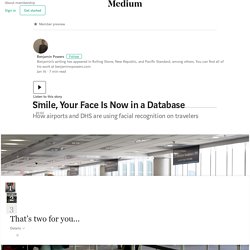
If you aren’t a U.S. citizen, you might need more than just your documents in these 10 airports: Hartsfield-Jackson in Atlanta, Logan in Boston, O’Hare in Chicago, Hobby and George Bush in Houston, McCarran in Las Vegas, Miami International, John F. Kennedy in New York, and Dulles International Airport in Washington, D.C. As part of Trump’s executive order banning certain Muslims from entering the United States, the Department of Homeland Security (DHS)—specifically U.S. Customs and Border Protection (CBP)—has ramped up and expanded its Biometric Exit program, which gathers biometric data from international individuals exiting the United States to document and verify that they’ve left. But instead of the fingerprints or document review DHS had been using as biometrics verifiers since 2004, the focus now is on facial recognition.
John Wagner, deputy assistant commissioner at CBP, outlined the program vision in early May. 12 pictures that show the complete absurdity of using age software on refugees. On Wednesday, Microsoft told indy100 that the facial recognition used by the Daily Mail and the Express to allege a refugee was overage was never intended to be used for this purpose.
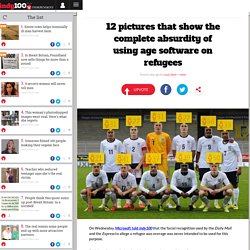
Social media users first noticed the inappropriate use of the software. A spokesperson for the company then told us: How-old.net was designed to be an example of how developers could build a fun app using modern development practices. It is not intended to be used as a definitive assessment of age. Regardless, the Express and the Mail have continued to use the software to allege that child refugees admitted from the Calais camp are overage, running pieces online littered with pictures from the app. Creepy or cool? Snap photos of strangers to find them on social media. KK: Do tech companies have a duty to protect people’s identities?

AK: We just launched the cloud face recognition software platform, which is available for every business to plug into and use for their own recognition tasks. But we will thoroughly monitor its usage and ban those organisations and people who try to use it inappropriately. Facial-recognition-used-in-public-services-card-programme-department-says-1. The Department of Social Protection has confirmed that it carries out biometric processing and uses facial recognition technologies as part of its controversial public services card (PSC) programme.
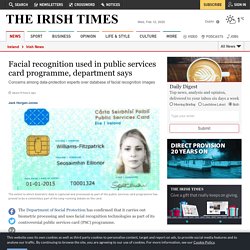
The confirmation prompted concerns among data-protection experts, who said there are questions over the proportionality of creating a database of facial recognition images due to the risks attached. In a revised version of its privacy statement published on Monday night, the department stated that the biometric processing of photographs would be used to identify cases of welfare fraud. It said the photographs were processed to produce a template that allows comparison with other images to detect cases of identity theft or double claiming of benefits. The previous version of the privacy statement contained no reference to biometric processing. Facial recognition and fundamental rights 101. By Ella Jakubowska This is the first post in a series about the fundamental rights impacts of facial recognition.
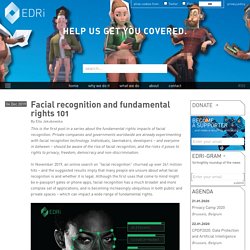
Private companies and governments worldwide are already experimenting with facial recognition technology. Individuals, lawmakers, developers – and everyone in between – should be aware of the rise of facial recognition, and the risks it poses to rights to privacy, freedom, democracy and non-discrimination. S Use of Your Data. As facial recognition use grows, so do privacy fears. Why We Should Ban Facial Recognition Technology. Photo: Qilai Shen/Bloomberg via Getty Images Of the many unsettling aspects to Clearview AI, a shadowy facial-recognition-software company providing users access to a database of 3 billion photographs scraped from social media and video streaming sites, the one that has most unsettled me is the pervasive sense that there is nothing we can do about it.

Facial ID Respirator Masks. Digitaltrends. Why Tech Employees Are Rebelling Against Their Bosses. Memo to the DOJ: Facial Recognition’s Threat to Privacy is Worse Than Anyone Thought. Before all of this ever went down In another place, another town You were just a face in the crowd You were just a face in the crowd Out in the street walking around A face in the crowd-Tom Petty If we don’t speak up now, the days when we can walk around with our heads held high without fear of surveillance are numbered.
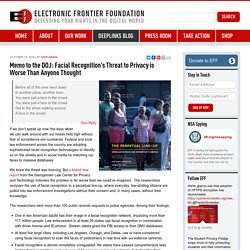
Federal and local law enforcement across the country are adopting sophisticated facial recognition technologies to identify us on the streets and in social media by matching our faces to massive databases. We knew the threat was looming. But a brand new report from the Georgetown Law Center for Privacy and Technology indicates the problem is far worse than we could’ve imagined. The researchers compare the use of facial recognition to a perpetual line-up, where everyday, law-abiding citizens are pulled into law enforcement investigations without their consent and, in many cases, without their knowledge. 1. Read the coalition letter to the U.S. Buzzfeednews. Facial recognition technology is the new rogues’ gallery.
Fueled by explosive reporting, foreign totalitarian regimes, and a lifetime of dystopian sci-fi, the movement to ban the government’s use of face recognition technology is growing.
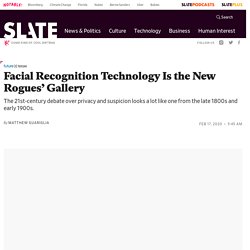
As of now, seven cities across the country—San Francisco, Oakland, and Berkeley in California, and Brookline, Somerville, Northampton, and Cambridge in Massachusetts—have banned the government use of face recognition. The entire state of California also passed a three-year moratorium on the use of face recognition on police body cameras. Part of the opposition stems from the fact that many don’t want police to have the ability to track movement around a city or learn the identities of protesters. Big Brother is watching you – so what?, Iain Bourne.
On Friday, the Home Secretary Sajid Javid backed police trials of facial recognition technology in the UK, sparking widespread outrage from privacy campaigners.
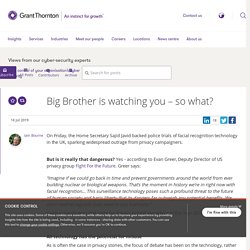
But is it really that dangerous? Yes - according to Evan Greer, Deputy Director of US privacy group Fight For the Future. Greer says: “Imagine if we could go back in time and prevent governments around the world from ever building nuclear or biological weapons. D-ID Is Altering Facial Recognition’s Path Towards Privacy. ICE Used Facial Recognition to Mine State Driver’s License Databases.
Facial recognition software 'sounds like science fiction,' but may affect half of Americans - Home. Thursday October 20, 2016 Next time you're walking down a busy sidewalk, look at the person on your left. Then, look at the person on your right. Next, look up at the security camera mounted on the side of a building. Chances are, that camera can recognize one of the people beside you.
And maybe you too. That's a creepy thought. An image from an October, 2016 report called "The Perpetual Line-up" from the Center on Privacy & Technology at Georgetown Law. New York tenants fight as landlords embrace facial recognition cameras. Tenants in a New York City apartment complex are fighting their landlord’s effort to install a facial recognition system to access parts of the buildings, calling it an affront to their privacy rights.

The row, which the tenants believe could become an important test case, comes as concern about the spread of facial recognition systems has grown across the US and globally, with law enforcement agencies increasingly relying on the tool. San Francisco this month became the first US city to ban city police and government agencies from using it. Private firms are also increasingly keen on the technology. At Atlantic Plaza Towers in the Brownsville neighborhood of Brooklyn, the landlord, Nelson Management Group, is moving to install a new system to control entry into the buildings. San Francisco Is Right: Facial Recognition Must Be Put On Hold. - The Washington Post.
Blog: Live facial recognition technology - data protection law applies. A blog by Elizabeth Denham, Information Commissioner 9 July 2019 Any organisation using software that can recognise a face amongst a crowd then scan large databases of people to check for a match in a matter of seconds, is processing personal data. For the past year, South Wales Police and the Met Police have been trialling live facial recognition (LFR) technology that uses this software, in public spaces, to identify individuals at risk or those linked to a range of criminal activity - from violent crime to less serious offences.
We understand the purpose is to catch criminals. Tough-new-rules-for-big-brother-face-reading-technology-in-schools-20190205-p... He criticised the federal government for awarding Melbourne-based start-up LoopLearn – which is trialling the technology in Australian schools – an almost $500,000 grant to make the product commercially viable. Related Article "I remain concerned about any rollout of this initiative. The fact that Scott Morrison is supporting this Big Brother style system in our classroom does not change that," he said. "Teachers are best placed to record student attendance, not robots. " Under the new rules, schools must undertake a rigorous privacy assessment of the surveillance technology and receive explicit, informed consent from parents and carers.
"If these things have not been done to a level that alleviates my concerns then no government school will implement the technology," Mr Merlino said. The new rules are detailed in a memo that will be circulated to state schools on Tuesday afternoon. If a student is missing, a notification is sent to a staff member. Education Editor at The Age. Is Your Picture Part of Secret AI Training? What if uploading your photos to the cloud made you and your family part of an AI training product? Apparently, that's happening with an app called Ever. Its Twitter feed is full of heartwarming photos: However, NBC News broke the story of how the Ever app is reportedly taking customer photos and using them to train Artificial Intelligence and resell it.
Millions of customers using it to store life's moments may now be part of the company's AI business model. The practice was hidden until NBC came calling: New tool helps travelers avoid airlines that use facial recognition technolog... A new tool launched by privacy activists offers to help travelers avoid increasingly invasive facial recognition technologies in airports. Activist groups Fight for the Future, Demand Progress and Credo on Wednesday unveiled a new website called AirlinePrivacy.com, which shows users what airlines use facial recognition to verify the identity of passengers before boarding.
The site also helps customers to directly book flights with airlines that don’t use facial recognition technologies. Airlines’ use of facial recognition technology is raising fresh questions about privacy and data security, advocates have argued. Instead of verifying passengers’ details by scanning a boarding pass, the technology – which is provided by government agencies – scans passengers’ faces and sends that information to border control to verify identity and flight details. Since then, more airlines have begun incorporating the technology, including Delta, American Airlines, British Airways and Lufthansa. Facial recognition overkill: How deputies cracked a $12 shoplifting case.
Facial recognition's 'dirty little secret': Millions of online photos scraped without consent. Breaking News Emails Get breaking news alerts and special reports. The news and stories that matter, delivered weekday mornings. March 12, 2019, 8:32 AM UTC / Updated March 17, 2019, 3:25 PM UTC By Olivia Solon. IBM stirs controversy by sharing photos for AI facial recognition. S Use of Your Data. Releases Understanding Facial Detection, Characterization, and Recognition Te... NYC councilman Ritchie Torres takes on face recognition. Are you being scanned? How facial recognition technology follows you, even as you shop.
If you shop at Westfield, you’ve probably been scanned and recorded by dozens of hidden cameras built into the centres’ digital advertising billboards. The semi-camouflaged cameras can determine not only your age and gender but your mood, cueing up tailored advertisements within seconds, thanks to facial detection technology. Westfield’s Smartscreen network was developed by the French software firm Quividi back in 2015. Their discreet cameras capture blurry images of shoppers and apply statistical analysis to identify audience demographics. And once the billboards have your attention they hit record, sharing your reaction with advertisers.
This creepy facial recognition app lets users find strangers on Facebook by t... Philosophical Transactions of the Royal Society A: Mathematical, Physical and Engineering Sciences. Startup: Identifying Dangerous Individuals Using Biometric Face Structure - iHLS. Real-Time Face Recognition Threatens to Turn Cops’ Body Cameras Into Surveill... Last year, a Russian startup announced that it could scan the faces of people passing by Moscow’s thousands of CCTV cameras and pick out wanted criminals or missing persons. Unlike much face recognition technology — which runs stills from videos or photographs after the fact — NTechLab’s FindFace algorithm has achieved a feat that once only seemed possible in the science fictional universe of “Minority Report”: It can determine not just who someone is, but where they’ve been, where they’re going, and whether they have an outstanding warrant, immigration detainer, or unpaid traffic ticket. For years, the development of real-time face recognition has been hampered by poor video resolution, the angles of bodies in motion, and limited computing power.
But as systems begin to transcend these technical barriers, they are also outpacing the development of policies to constrain them. Police see the appeal. Photo: David McNew/Getty Images A Digital Enemies List Photo: Mary Altaffer/AP. Are you looking at me? Welcome to the world of facial recognition. Making face recognition less biased doesn’t make it less scary. In the past few years, there’s been a dramatic rise in the adoption of face recognition, detection, and analysis technology.
You’re probably most familiar with recognition systems, like Facebook’s photo-tagging recommender and Apple’s FaceID, which can identify specific individuals. Detection systems, on the other hand, determine whether a face is present at all; and analysis systems try to identify aspects like gender and race. All of these systems are now being used for a variety of purposes, from hiring and retail to security and surveillance.
Professor Says Police Bodycam Study Suffers from ‘Fatal Flaw’ - Law Blog. The quiet and creeping normalisation of facial recognition technology. NYPD Refuses to Disclose Information About Its Face Recognition Program, So P... Population on. facial recognition database. Location app+facial recognition at bars. FB facial recognition. Facial recognition privacy/regulation. La reconnaissance faciale bientôt utilisée en France pour les services publics en ligne ? Alicem est une application pour smartphone développée par le ministère de l'Intérieur et l'Agence nationale des titres sécurisés (ANTS). Plow.